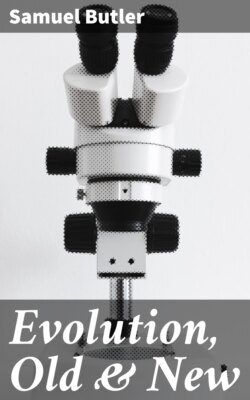Читать книгу Evolution, Old & New - Samuel Butler - Страница 8
На сайте Литреса книга снята с продажи.
Оглавление"Der erste dieser beiden Erklärungsversuche, ist eine wahre 'Philosophie des Unbewussten' nicht des Hartmann'schen Unbewussten welches hellsehend und wunderthätig von aussen in die natürliche Entwickelung der Organismen eingreift, sondern eines Unbewussten welches wie der Verfasser zeigt, in allen organischen Wesen anzunehmen unsere eigene Erfahrung und die Stufenfolge der Organismen von den Moneren und Amœben bis zu den höchsten Pflanzen und Thieren und uns selbst aufwärts—uns gestattet, wenn nicht uns nöthigt. Der Gedankengang dieser neuen oder wenigstens in diesem Sinne wohl zum ersten Male consequent im Einzelnen durchgeführten Philosophie des Unbewussten ist, seinen Hauptzügen nach kurz angedeutet, folgender."[27]
Even here I am made to personify more than I like; I do not wish to say that the unconscious does this or that, but that when we have done this or that sufficiently often we do it unconsciously.
If the foregoing be granted, and it be admitted that the unconsciousness and seeming automatism with which any action may be performed is no bar to its having a foundation in memory, reason, and at one time consciously recognized effort—and this I believe to be the chief addition which I have ventured to make to the theory of Buffon and Dr. Erasmus Darwin—then the wideness of the difference between the Darwinism of eighty years ago and the Darwinism of to-day becomes immediately apparent, and it also becomes apparent, how important and interesting is the issue which is raised between them.
According to the older Darwinism the lungs are just as purposive as the corkscrew. They, no less than the corkscrew, are a piece of mechanism designed and gradually improved upon and perfected by an intelligent creature for the gratification of its own needs. True there are many important differences between mechanism which is part of the body, and mechanism which is no such part, but the differences are such as do not affect the fact that in each case the result, whether, for example, lungs or corkscrew, is due to desire, invention, and design.
And now I will ask one more question, which may seem, perhaps, to have but little importance, but which I find personally interesting. I have been told by a reviewer, of whom upon the whole I have little reason to complain, that the theory I put forward in 'Life and Habit,' and which I am now again insisting on, is pessimism—pure and simple. I have a very vague idea what pessimism means, but I should be sorry to believe that I am a pessimist. Which, I would ask, is the pessimist? He who sees love of beauty, design, steadfastness of purpose, intelligence, courage, and every quality to which success has assigned the name of "worth," as having drawn the pattern of every leaf and organ now and in all past time, or he who sees nothing in the world of nature but a chapter of accidents and of forces interacting blindly?
